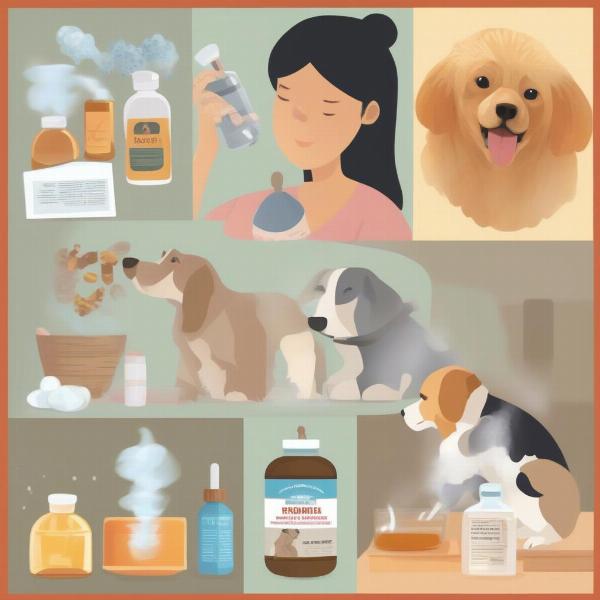Robitussin DM is a common over-the-counter medication used to treat coughs in humans. But can you give it to your dog? While some forms of Robitussin may be used in dogs under strict veterinary supervision to manage certain types of coughs, giving your dog Robitussin DM is generally not recommended. This article will explain why it’s important to avoid giving your dog Robitussin DM, discuss safe alternatives for managing your dog’s cough, and emphasize the importance of consulting a veterinarian.
Understanding the Risks of Robitussin DM for Dogs
Robitussin DM contains two active ingredients: dextromethorphan (DXM), a cough suppressant, and guaifenesin, an expectorant. While DXM can be used in dogs in specific situations and at precisely calculated dosages, the presence of guaifenesin in Robitussin DM makes it unsuitable for canine use. Guaifenesin can cause vomiting, diarrhea, and other gastrointestinal issues in dogs. Furthermore, many formulations of Robitussin DM contain other ingredients like alcohol, xylitol, or pseudoephedrine, which are highly toxic to dogs. Even small amounts of these substances can cause serious health problems, including liver failure, seizures, and even death.
Safe Alternatives for Treating Your Dog’s Cough
If your dog is coughing, it’s crucial to consult your veterinarian to determine the underlying cause. A cough can be a symptom of a range of conditions, from kennel cough to heart disease. Your vet can diagnose the problem and recommend the appropriate treatment. Some safe and effective alternatives for managing a dog’s cough include:
- Prescription Cough Suppressants: Your vet may prescribe a cough suppressant specifically formulated for dogs, such as hydrocodone or butorphanol.
- Antibiotics: If the cough is caused by a bacterial infection, antibiotics may be necessary.
- Bronchodilators: These medications can help open up the airways and relieve coughing in dogs with asthma or bronchitis.
- Home Remedies: For mild coughs, your vet might recommend home remedies such as using a humidifier or providing warm, honey-infused water (avoid honey for puppies under one year old).
 Safe cough remedies for dogs
Safe cough remedies for dogs
Why a Vet Visit is Essential
Never attempt to self-treat your dog’s cough. Giving your dog human medications without veterinary guidance can have serious consequences. A veterinarian can accurately diagnose the cause of the cough and ensure your dog receives the correct treatment and dosage.
When is Robitussin (without DM) Ever Considered for Dogs?
In some very specific cases, a veterinarian might prescribe a plain Robitussin formulation (without DM or other added ingredients) containing only dextromethorphan to manage certain types of non-productive coughs in dogs. However, this is rare and the dosage must be precisely calculated based on the dog’s weight and health condition. Even then, it’s crucial to follow the veterinarian’s instructions meticulously.
Conclusion
While you might be tempted to give your dog Robitussin DM to relieve their cough, it’s crucial to understand the potential risks involved. Guaifenesin and other ingredients commonly found in Robitussin DM can be toxic to dogs. Always consult your veterinarian before giving your dog any medication, including over-the-counter drugs. They can diagnose the underlying cause of your dog’s cough and recommend the safest and most effective treatment options.
FAQ
- Can I give my dog Robitussin DM for kennel cough? No, do not give your dog Robitussin DM for kennel cough or any other condition without consulting your vet.
- What should I do if my dog accidentally ingests Robitussin DM? Contact your veterinarian or an emergency animal hospital immediately.
- Are there any natural remedies for dog coughs? Consult your vet before trying any home remedies, as they may not be suitable for all conditions.
- How can I prevent my dog from coughing? Keeping your dog’s vaccinations up-to-date and avoiding contact with sick animals can help prevent some infectious causes of coughing.
- Is a cough always a serious sign in dogs? While some coughs can be minor, a persistent cough can indicate a more serious underlying condition. It’s always best to consult your veterinarian.
- What are the signs of a serious cough in dogs? Difficulty breathing, lethargy, loss of appetite, and a bluish tint to the gums can indicate a serious respiratory problem.
- How is a dog’s cough diagnosed? Your veterinarian will perform a physical exam and may recommend further tests, such as blood work, X-rays, or other diagnostic procedures.
ILM Dog is your go-to resource for expert advice on all aspects of dog care, from breed selection and health to training and nutrition. We offer practical, reliable information to help you provide the best possible care for your furry friend. Whether you’re a new dog owner or a seasoned pro, we’re here to support you every step of the way. Contact us for expert guidance: Email: [email protected], Phone: +44 20-3965-8624. ILM Dog is committed to providing you with the most up-to-date information and resources to ensure your dog’s health and happiness.